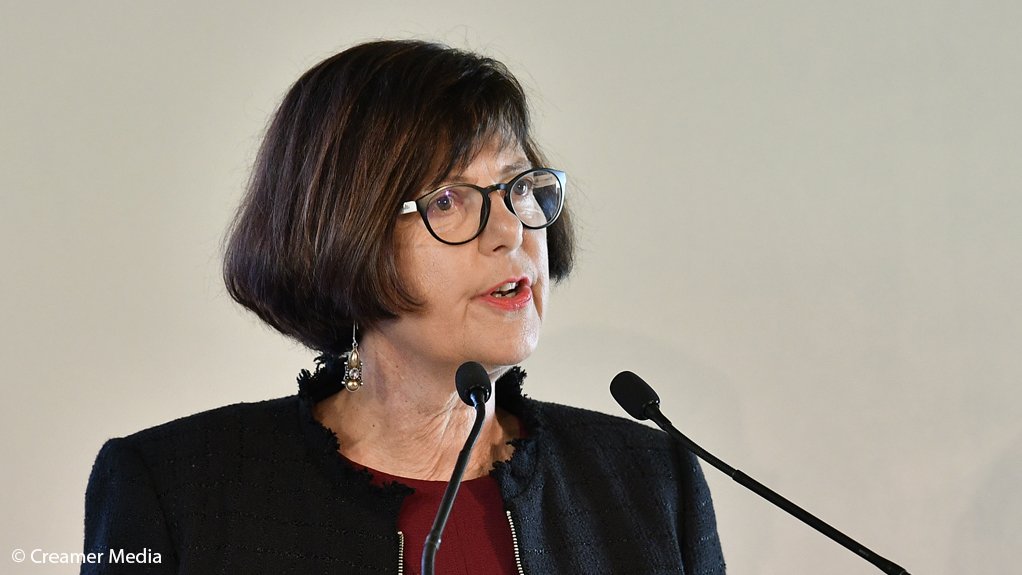COP26 must unlock climate support from developed to developing countries – Creecy


Forestry, Fisheries and the Environment Minister Barbara Creecy
Photo by Creamer Media's Donna Slater
South Africa’s Forestry, Fisheries and the Environment Minister Barbara Creecy says the COP26 climate talks scheduled for Glasgow, Scotland, in November need to prioritise the securing of finance, technology and capacity building support from developed to developing countries.
Addressing a virtual event on Monday, Creecy reiterated that Africa – which had contributed only one percent of global emissions historically and was already being unfairly burdened by the effects of climate change – required such support if it was to turn its climate change liability into a new opportunity for green growth and job creation.
“Significant long-term financial resources, at concessional rates, will be needed to introduce new technologies and open up significant new job creation opportunities so that our country joins others who are benefiting from the green technological transition across the world,” Creecy said during the event, hosted jointly by Standard Bank and the University of London's School of Oriental and African Studies.
Investment in the green economy provided strategic advantages and new economic prospects, she said, quoting a recent Accenture report that estimates that green industries and technology could unlock economic activities to the value of $350-billion across Africa.
“It opens access to new financing opportunities, it offers the possibility of significant proven job creation, it has potential to localise production and services, which will build small and medium enterprises and, of course, it enhances our long-term competitiveness while mitigating our transition risks.”
Creecy’s address follows Cabinet’s recent approval of a revised Nationally Determined Contribution decarbonisation range for 2030 of 420- to 350-million tons of carbon dioxide equivalent (Mt CO2-eq) for 2030, which represents a marked improvement on its 2015 pledge of 614 Mt CO2-eq to 398 Mt CO2-eq.
The upper end of the range is aligned with the Paris Agreement goal of restricting the rise in emissions to below 2 °C above preindustrial levels, while the lower figure is aligned with an emerging ambition to limit the increase to below 1.5 °C.
It also follows a recent visit to South Africa by climate envoys from France, Germany, the UK, the US and the European Union, during which opportunities for enhanced cooperation, financing and support for South Africa’s transition to a low-carbon economy were explored.
During the visit, South Africa underlined its commitment to a just transition, but called for greater certainty and predictability about the financing that would be made available to help the coal-dependent country accelerate its transition.
South Africa proposed the establishment of a Just Transition Financing Facility, supported by developed country finance, to enable ambitious climate action, while also addressing the social impacts of the transition.
The country also underlined the need for concessional and grant funding, which took account of its current fiscal constraints.
“South Africa remains committed to the Paris Agreement and believes that all three aspects – adaptation, mitigation and means of support and finance – must be given equal priority,” Creecy said.
“Our ambition in the context of a just transition involves pursuing our development goals in the process of cutting emissions and building resilience, expanding employment and building a skills base and managing adjustment processes.”
There was also a need, however, for a comprehensive shift in how the financial system worked, to reorient capital to more sustainable investments.
“This is necessary if South Africa is to develop more sustainable economic growth, ensure the stability of the financial system and foster more transparency and longevity in the economy.”
Standard Bank CEO Sim Tshabalala agreed that financial instruments and technical expertise, coupled with appropriate policy and regulation, would be required to facilitate a just transition.
“Bringing together this combination of conditions will, in turn, require a considerable degree of political and social consensus,” he added.
Tshabalala said it was also “entirely appropriate” for the financial sector’s approach towards climate change and the transition to be scrutinised, given the sector’s role in allocating resources.
“However, a singular focus on the sector, without paying sufficient attention to the broader circumstances, is likely to have sub-optimal or even perverse outcomes,” he warned.
Comments
Press Office
Announcements
What's On
Subscribe to improve your user experience...
Option 1 (equivalent of R125 a month):
Receive a weekly copy of Creamer Media's Engineering News & Mining Weekly magazine
(print copy for those in South Africa and e-magazine for those outside of South Africa)
Receive daily email newsletters
Access to full search results
Access archive of magazine back copies
Access to Projects in Progress
Access to ONE Research Report of your choice in PDF format
Option 2 (equivalent of R375 a month):
All benefits from Option 1
PLUS
Access to Creamer Media's Research Channel Africa for ALL Research Reports, in PDF format, on various industrial and mining sectors
including Electricity; Water; Energy Transition; Hydrogen; Roads, Rail and Ports; Coal; Gold; Platinum; Battery Metals; etc.
Already a subscriber?
Forgotten your password?
Receive weekly copy of Creamer Media's Engineering News & Mining Weekly magazine (print copy for those in South Africa and e-magazine for those outside of South Africa)
➕
Recieve daily email newsletters
➕
Access to full search results
➕
Access archive of magazine back copies
➕
Access to Projects in Progress
➕
Access to ONE Research Report of your choice in PDF format
RESEARCH CHANNEL AFRICA
R4500 (equivalent of R375 a month)
SUBSCRIBEAll benefits from Option 1
➕
Access to Creamer Media's Research Channel Africa for ALL Research Reports on various industrial and mining sectors, in PDF format, including on:
Electricity
➕
Water
➕
Energy Transition
➕
Hydrogen
➕
Roads, Rail and Ports
➕
Coal
➕
Gold
➕
Platinum
➕
Battery Metals
➕
etc.
Receive all benefits from Option 1 or Option 2 delivered to numerous people at your company
➕
Multiple User names and Passwords for simultaneous log-ins
➕
Intranet integration access to all in your organisation



















